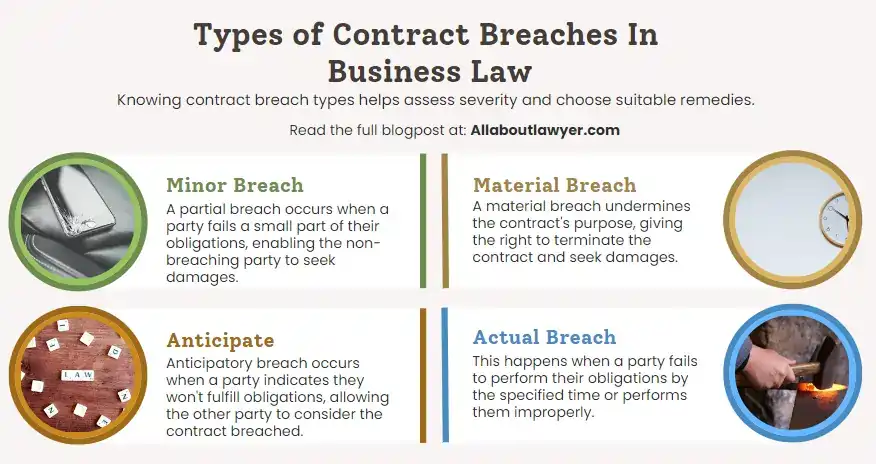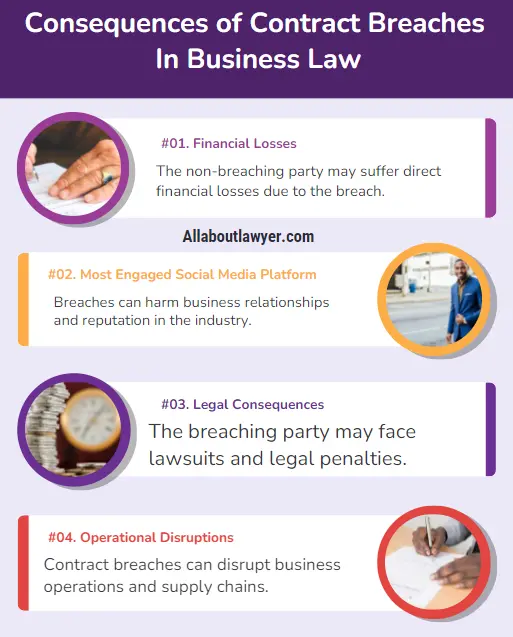What is Breach of Contract in Business Law?
In the intricate world of business, contracts serve as the cornerstone of commercial relationships. These legally binding agreements outline the rights, responsibilities, and obligations of parties involved in a transaction or partnership. However, when one party fails to fulfill their contractual duties, it results in a breach of contract. This article delves deep into the concept of what is breach of contract in business law, exploring its various facets, implications, and remedies.
Table of Contents
Defining Breach of Contract In Business Law
At its core, a breach of contract occurs when a party to a legally binding agreement fails to perform their contractual obligations without a valid legal excuse. This contractual violation can manifest in various forms, ranging from minor infractions to significant agreement infringements that undermine the entire purpose of the contract.
Types of Contract Breaches In Business Law
Understanding the different types of contract breaches is crucial for assessing the severity of the infraction and determining appropriate remedies. Generally, breaches of contract can be categorized into four main types:
1. Minor Breach:
Also known as a partial breach, this occurs when a party fails to fulfill a small part of their contractual obligations. While a minor breach doesn’t typically invalidate the entire contract, it may still entitle the non-breaching party to seek damages for any losses incurred.
2. Material Breach:
This is a significant violation that goes to the heart of the contract, substantially undermining its purpose. A material breach often gives the non-breaching party the right to terminate the contract and seek damages.
3. Anticipatory Breach:
This occurs when one party indicates, either through words or actions, that they will not fulfill their contractual obligations in the future. This allows the non-breaching party to consider the contract breached before the actual time of performance.
4. Actual Breach:
This happens when a party fails to perform their obligations by the specified time or performs them improperly.

Elements of a Breach of Contract In Business Law
To establish a breach of contract in a legal setting, several key elements must be proven:
1. Existence of a Valid Contract:
There must be a legally binding agreement in place. This requires offer, acceptance, consideration, and the intent to create legal relations.
2. Performance Due:
The time for performance as stipulated in the contract must have arrived.
3. Non-Performance or Improper Performance:
There must be evidence that one party failed to perform their obligations as agreed or performed them improperly.
4. No Legal Excuse for Non-Performance:
The breaching party must not have a valid legal excuse for their failure to perform.
Common Scenarios of Contract Breaches in Business
Contract breaches can occur in various business contexts. Some common scenarios include:
1. Failure to Deliver Goods or Services:
When a supplier fails to provide the agreed-upon goods or services within the specified timeframe or to the required quality standards.
2. Non-Payment:
When a party fails to make payments as stipulated in the contract.
3. Quality Issues:
When delivered goods or services fail to meet the quality standards outlined in the agreement.
4. Confidentiality Breaches:
When a party discloses confidential information in violation of a non-disclosure agreement.
5. Non-Compete Violations:
When an employee or business partner engages in competitive activities contrary to a non-compete clause.
Determining a Breach of Contract
Identifying a breach of contract involves a careful examination of the contract terms and the actions (or inactions) of the parties involved. Key considerations include:
1. Contract Language:
The specific wording of the contract is crucial in determining what constitutes a breach.
2. Performance Standards:
Any standards or metrics for performance outlined in the contract must be considered.
3. Time Factors:
Whether time was of the essence in the contract and if deadlines were met.
4. Materiality:
The significance of the breach in relation to the overall purpose of the contract.
Consequences of Contract Breaches In Business Law

The repercussions of a contract breach can be significant and far-reaching:
1. Financial Losses:
The non-breaching party may suffer direct financial losses due to the breach.
2. Reputational Damage:
Breaches can harm business relationships and reputation in the industry.
3. Legal Consequences:
The breaching party may face lawsuits and legal penalties.
4. Operational Disruptions:
Contract breaches can disrupt business operations and supply chains.
Remedies for Breach of Contract
When faced with a contract breach, the non-breaching party has several potential remedies:
1. Damages:
Monetary compensation to cover losses resulting from the breach. Types of damages include:
– Compensatory damages
– Consequential damages
– Liquidated damages
– Punitive damages (in rare cases)
2. Specific Performance:
A court order requiring the breaching party to fulfill their contractual obligations.
3. Rescission:
Cancellation of the contract, returning both parties to their pre-contractual positions.
4. Reformation:
Modification of the contract terms to reflect the true intent of the parties.
Preventing Contract Breaches In Business Law
Proactive measures can significantly reduce the risk of contract breaches:
1. Clear Contract Drafting:
Ensuring contracts are clear, comprehensive, and unambiguous.
2. Due Diligence:
Thoroughly vetting potential business partners before entering into agreements.
3. Performance Monitoring:
Regularly monitoring contract performance and addressing issues promptly.
4. Communication:
Maintaining open lines of communication between parties to address concerns early.
5. Dispute Resolution Clauses:
Including mechanisms for resolving disputes without resorting to litigation.
Legal Defenses to Breach of Contract Claims
In some cases, a party accused of breaching a contract may have valid legal defenses:
1. Lack of Capacity: If one party lacked the legal capacity to enter into the contract.
2. Fraud or Misrepresentation: If the contract was induced by fraudulent means.
3. Duress: If one party was coerced into entering the contract.
4. Impossibility of Performance: If unforeseen circumstances make performance impossible.
5. Statute of Limitations: If the claim is brought after the legal time limit for filing has expired.
The Role of Alternative Dispute Resolution
In many cases, parties may prefer to resolve contract disputes through alternative methods rather than litigation:
1. Negotiation: Direct discussions between parties to reach a mutually acceptable resolution.
2. Mediation: A neutral third party facilitates discussions to help parties reach an agreement.
3. Arbitration: A private, binding process where an arbitrator or panel makes a decision on the dispute.
These methods can often be faster, less costly, and more flexible than traditional court proceedings.
International Aspects of Contract Breaches
In an increasingly globalized business environment, contract breaches can involve international elements:
1. Choice of Law: Determining which country’s laws govern the contract.
2. Jurisdiction: Establishing which courts have the authority to hear the case.
3. Enforcement: Challenges in enforcing judgments across international borders.
4. Cultural Differences: Varying interpretations of contract terms and business practices across cultures.
Technological Considerations in Modern Contract Breaches
The digital age has introduced new dimensions to contract law:
1. Electronic Contracts: Issues surrounding the validity and breach of electronically formed contracts.
2. Smart Contracts: Self-executing contracts with the terms directly written into code.
3. Data Breaches: Violations of data protection clauses in contracts.
4. Cybersecurity Obligations: Breaches related to failure to maintain adequate cybersecurity measures.
Conclusion
Understanding breach of contract in business law is crucial for any entity engaged in commercial activities. It encompasses a wide range of concepts, from identifying different types of breaches to understanding available remedies and prevention strategies. By grasping these fundamental principles, businesses can better protect their interests, maintain strong commercial relationships, and navigate the complex landscape of contract law effectively.
As business environments continue to evolve, so too will the nuances of contract law. Staying informed about these changes and seeking professional legal advice when needed will be key to successfully managing contractual relationships and mitigating the risks associated with potential breaches.
Related Articles For You:
How Much Does a Medicaid Lawyer Cost?
Questions to Ask a Lawyer When Starting a Business
FAQs
Q: What is the difference between a material and minor breach of contract?
A: A material breach is a significant violation that substantially undermines the purpose of the contract, often giving the non-breaching party the right to terminate the contract and seek damages. A minor breach, also known as a partial breach, occurs when a party fails to fulfill a small part of their contractual obligations but doesn’t typically invalidate the entire contract.
Q: Can a breach of contract occur before the performance is due?
A: Yes, this is known as an anticipatory breach. It occurs when one party indicates, either through words or actions, that they will not fulfill their contractual obligations in the future. This allows the non-breaching party to consider the contract breached before the actual time of performance.
Q: What are the most common remedies for a breach of contract?
A: The most common remedies include:
1. Damages (monetary compensation)
2. Specific performance (court order to fulfill the contract)
3. Rescission (cancellation of the contract)
4. Reformation (modification of the contract terms)
Q: How long do I have to file a lawsuit for breach of contract?
A: The time limit, known as the statute of limitations, varies by jurisdiction and type of contract. In many U.S. states, it’s typically between 3 to 6 years for written contracts and 2 to 4 years for oral contracts. However, it’s crucial to check the specific laws in your jurisdiction.
Q: Can a contract be breached if it’s not in writing?
A: Yes, oral contracts can be legally binding and can be breached. However, proving the terms of an oral contract can be more challenging, which is why written contracts are generally preferred in business settings.
About the Author

Sarah Klein, JD, is a former civil litigation attorney with over a decade of experience in contract disputes, small claims, and neighbor conflicts. At All About Lawyer, she writes clear, practical guides to help people understand their civil legal rights and confidently handle everyday legal issues.
Read more about Sarah
